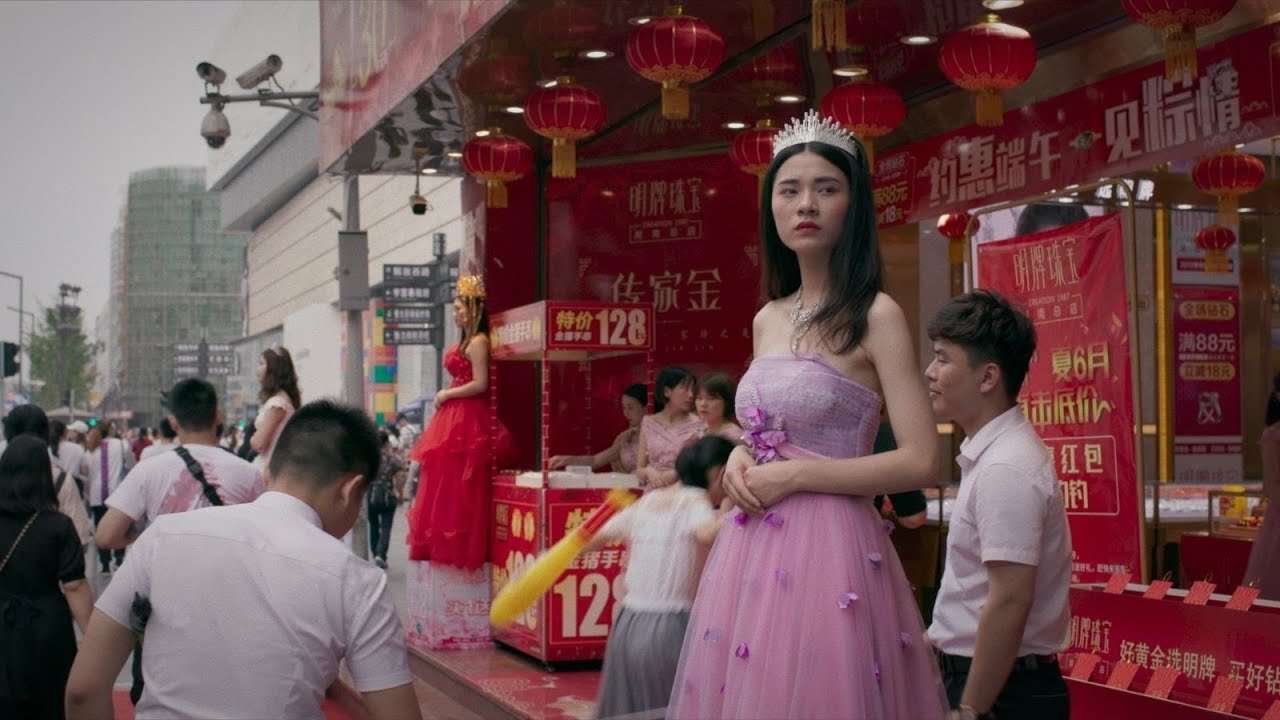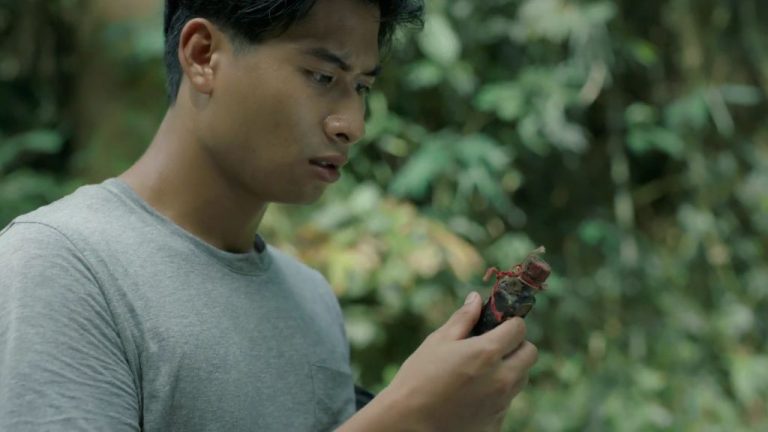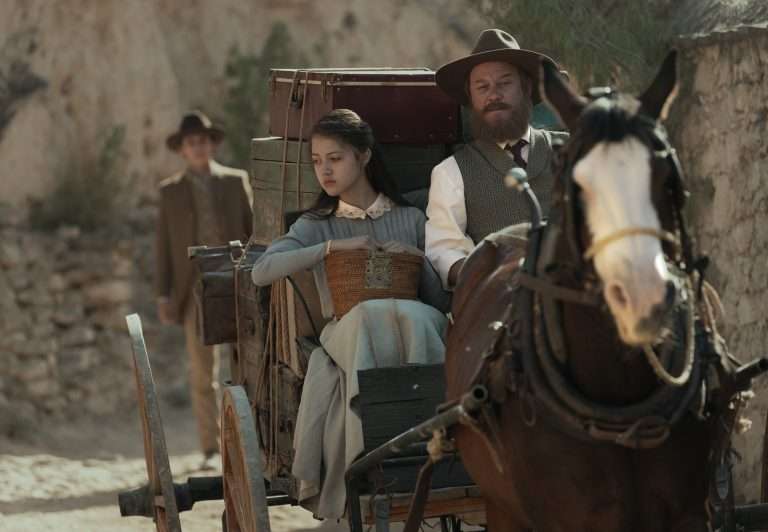The first shot of Huang Ji & Ryuji Otsuka’s feature film, ‘Stonewalling’ (the first with both collaborators being co-directors), has the magical feel of Apitchatpong Weerashetakul films. A red telephone booth full of books planted in the countryside among the trees, lit like a Xmas tree, suddenly closes its door. Cut to a party, in which the 20-year-old Lynn (Huang Ji’s now regular Yao Honggui) and her boyfriend Zhang (Liu Long) consider whether to stay at their friends’ party or leave. Lynn complains that the breasts are sore, and this line will haunt the whole movie—the end of magic.
Chinese director Huang Ji has presented a bleak but unflinchingly honest portrait of young women in post-capitalist China, both in her first feature, ‘Egg and Stone’ (2012), and in her follow-up, ‘The Foolish Bird’ (2017) film. Pregnancy in her work is the ancient mantra that resists all sorts of glamorization of Chinese society and makes her characters suffer as a result. Things are not different in ‘Stonewalling’; here, the narrative takes a decisively more defined terrain, resting on Lynn’s upcoming (and unwanted) pregnancy. The film’s running time of 148 minutes is still slow-burn compared to mainstream fare standards, but it reveals a 9-month essay on China’s contemporary consumerism and its aftermath.
Lynn is a flight attendant in training in Changsha (Hunan province) and does some part-time jobs wearing fake tiaras to lure jewelry clients. Her boyfriend is suave, stylish (he poses for various agencies), and loves his DJ’ing job more than he cares for Lynn. We now add Lynn’s parents to the melting pot, a gynecologist now reduced to selling ‘Vital Cream’ products for every use, and a father who has built a clinic that cannot run efficiently. Lynn is one of the ‘left-behind’ children (children who were left with relatives so that their parents could work in another town); her relationships with her parents amount to no more than a few phone calls and a regular sending of a money check (to them). The whole baby business will change that.
And it is a baby business for all its characters to execute; the film loosely spins its web to build a portrait of a world in which the most atrocious conversations are conducted inside of a car (in one instance, the KFC restaurant prominently shows as if it is a mark of honor for the shot). Lynn will need to reconnect with her parents, but moral conservatism has no place here. The upcoming baby is a tool in a transaction that Lynn needs to initiate and the whole family needs to implement.

In its crisp cinematography (by Ryuji Otsuka) and all-too-distanced and still wide shots (including the relative absence of musical cues), the film wants to have no part of this story and transaction. We are transported into a documentary world (the film ends with the beginning of the COVID pandemic), in which sanitizers now substitute beauty creams, and the question of a healthy society lingers on and builds momentum in the film’s somehow lax but still connected three acts. The Bong Joon-ho’s ‘Parasite‘ world, whose basement shows the society’s underbelly, is replaced here with a world proud of perpetuating fake promises (and shots of magnificent swimming pools while discussing strict employment demands).
Yao Honggui herself is an enigma, the kind of a person whose more revolutionary aspect is that she has no grand aspirations, and the actress manages to project both a poker face and an internal turmoil with her sudden bursts of movement – up to the last dramatic scene. ‘Stonewalling’ works like an opus of calculated sadness; this is a film in which pictures of infants do not cause joy but concern. So do the numerous beauty parlors, luxury stores, and skyscraper building shots in a movie whose stark lighting contrasts with its morally bereft (yet necessary for survival) business. Huang Ji & Ryuji Otsaka won’t judge their characters but make it clear that these characters are too busy with finding money to pay debts or fulfill their trite dream to do any, even elementary moral theorizing.
In one of the film’s later scenes, Lynn and her boyfriend meet after a long absence. Lynn is holding a money envelope for him, which he refuses to take; she insists, and he still refuses. The stillness of this scene (in the accompanying piano’s repetitive note -music by Chor Guan Ng is glaring; their relationship ended a long time ago, yet the economic exchange still needs to take place, and no one has a clue how to do that. The scene will refuse to give us a final resolution.
‘Stonewalling’ won’t offer very likable characters, and its coldness and pace could alienate the viewers who may not want to tread the path Lynn does. Yet it has a directorial masterplan executed up to the last bit, situations that reveal much more than their characters would admit, and a standpoint that goes beyond a ready-made criticism. Furthermore, it scrutinizes the apathy within the modern Chinese culture it depicts. Still, the private moments spent with Lynn alone in her room or bathroom present an alternate, more intimate reality (even if tortured) that could offer limited consolation. A film mostly to absorb and observe.




![Lookback on Lumet: The Anderson Tapes [1971]](https://79468c92.delivery.rocketcdn.me/wp-content/uploads/2018/07/anderson3-768x432.jpg)
![Vice [2018] Review: Too Many Vices](https://79468c92.delivery.rocketcdn.me/wp-content/uploads/2019/01/Vice_HOF_Review-768x318.jpg)
![Choked [2020] Netflix Review – A tale of a crumbling marriage crushed by a socio-political metaphor](https://79468c92.delivery.rocketcdn.me/wp-content/uploads/2020/06/Choked-highonfilms-768x432.jpg)